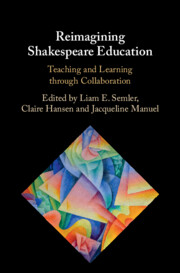Book contents
- Reimagining Shakespeare Education
- Reimagining Shakespeare Education
- Copyright page
- Dedication
- Contents
- Figures
- Tables
- Notes on Contributors
- Acknowledgements
- Introduction
- Part I Reimagining Shakespeare with/in Schools
- Introduction
- Chapter 1 Shakespeare Schools Foundation
- Chapter 2 Shakespeare and Citizenship in France
- Chapter 3 Bell Shakespeare
- Chapter 4 The Better Strangers/Shakespeare Reloaded Project
- Part II Reimagining Shakespeare with/in Universities
- Part III Public Reimaginings
- Part IV Digital Reimaginings
- Part V Reimagining Performance
- Afterword
- Index
- References
Chapter 4 - The Better Strangers/Shakespeare Reloaded Project
Seeking Educational Ardenspaces
from Part I - Reimagining Shakespeare with/in Schools
Published online by Cambridge University Press: 02 February 2023
- Reimagining Shakespeare Education
- Reimagining Shakespeare Education
- Copyright page
- Dedication
- Contents
- Figures
- Tables
- Notes on Contributors
- Acknowledgements
- Introduction
- Part I Reimagining Shakespeare with/in Schools
- Introduction
- Chapter 1 Shakespeare Schools Foundation
- Chapter 2 Shakespeare and Citizenship in France
- Chapter 3 Bell Shakespeare
- Chapter 4 The Better Strangers/Shakespeare Reloaded Project
- Part II Reimagining Shakespeare with/in Universities
- Part III Public Reimaginings
- Part IV Digital Reimaginings
- Part V Reimagining Performance
- Afterword
- Index
- References
Summary
This chapter describes the Better Strangers/Shakespeare Reloaded project, which is a collaborative education research partnership between the University of Sydney and Barker College (Sydney). The project’s initial design and its philosophical grounding in complexity theory are discussed before a detailed account is given of one teacher’s long-term involvement in project activities. The chapter describes many research and teaching initiatives and outputs generated during the life of the project and explains how they represent a pursuit of educational ardenspaces. Such ardenspaces are argued to be a necessary response to overly constraining educational systems because they allow imagination, creativity and freedom to flourish in teaching and learning.
- Type
- Chapter
- Information
- Reimagining Shakespeare EducationTeaching and Learning through Collaboration, pp. 69 - 84Publisher: Cambridge University PressPrint publication year: 2023

